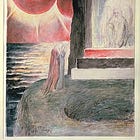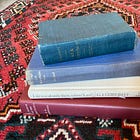Empty or Full Knowledge?
Continuing from:
For full citations of abbreviated references, see:
Ouspensky says of his time with Gurdjieff that in his lectures then he almost always reverted to the theme of "the line of knowledge and the line of being."1 He reports that Gurdjieff said:
"If knowledge outweighs being a man knows but has no power to do. It is useless knowledge. On the other hand if being outweighs knowledge a man has the power to do, but does not know, that is, he can do something but does not know what to do. The being he has acquired becomes aimless and efforts made to attain it prove to be useless.2
And:
"Knowledge by itself does not give understanding. Nor is understanding increased by an increase of knowledge alone. Understanding depends upon the relation of knowledge to being. Understanding is the resultant of knowledge and being."3
There seems to be some similarity between 1.) the difference between knowledge and being and the necessity for them both to develop in order that the third thing (understanding) can form or increase, and 2.) the difference between the terms personality and essence4 and their interdependence. For example, as Nicoll expressed it, personality must be well-furnished, personality protects essence, personality must become passive, essence must feed on personality.5 Do these have some sort of correspondence when compared to the domain of knowledge and being? After all, one could say that personality, the factors for which are described as entering us from outside, for example, through education and culture (as opposed to essence, which is our own)6 consists of "knowledge," as well as one's reaction to that "knowledge," or what are taken as facts, and is generally identified with. In contrast, essence seems closely connected to the idea of being, and the power to do. Gurdjieff said,
A man's real I, his individuality, can grow only from his essence.7
Yet, real knowledge itself seems such a big thing. Gurdjieff even said, in an early talk at the Prieuré in 1923, that knowledge is the meaning, or sense, of life, though, notably, he used the French word connaissance as well, to clarify.8 And the knowing that combines with being to make understanding is surely not just empty information from outside, but is perhaps more like realisation. This is similar to Nicoll saying,
…inner individual authentic perception…is the only source of real knowledge.9
Authentic perception is so often blocked by attention being bound by identification, and by associations, especially associations that have resulted from the fixing of impressions received in the ordinary so-called waking state, the most mechanical category of associations.10



